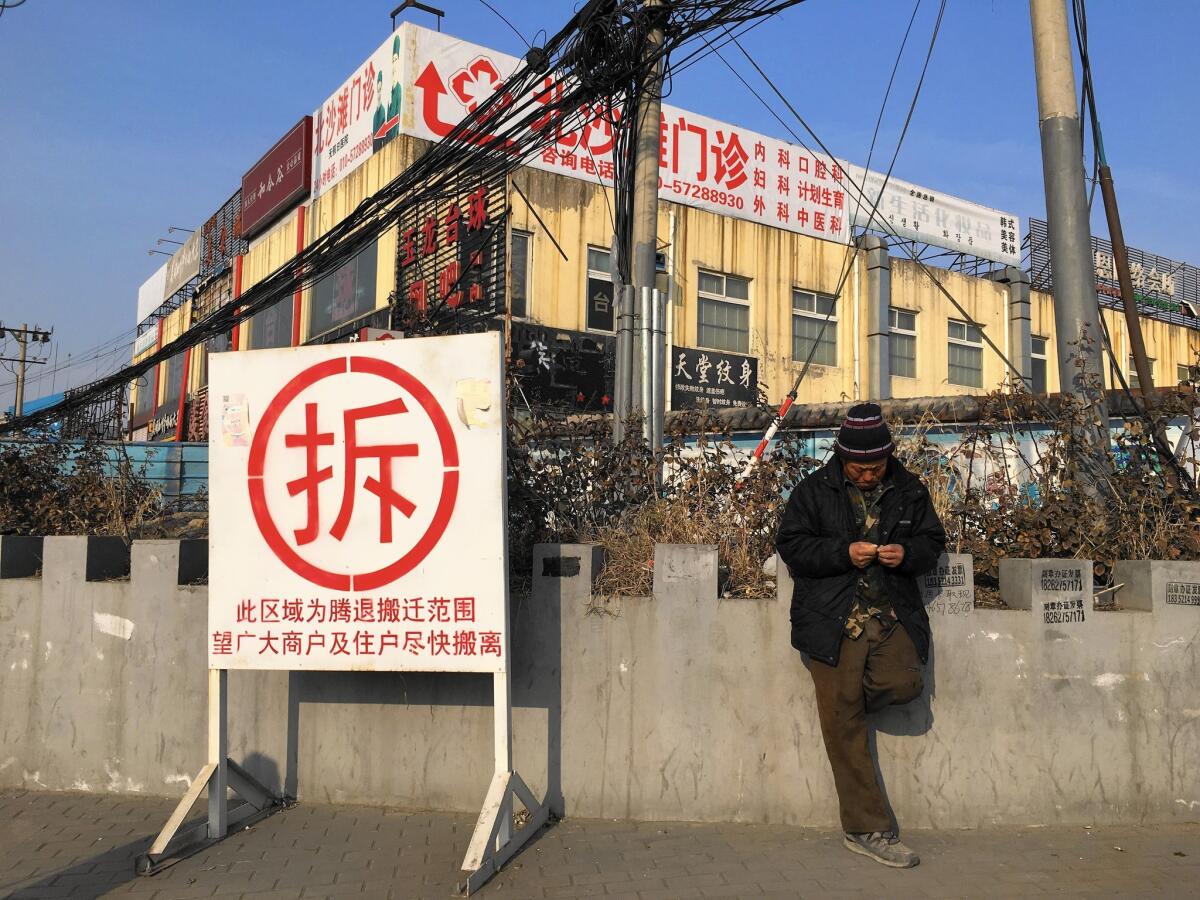After a year of disruption, China looks to 2016 with cautious optimism

Reporting from Beijing — Dongsheng village is a place of lives interrupted, of dreams deferred.
Dongsheng is one of Beijing’s largest slums, home to an estimated 100,000 people — an island of slapdash concrete homes amid shopping malls and highways in the city’s western Haidian district. Yet authorities recently announced plans to tear the neighborhood down by mid-2016 to make way for a “green space” and an office park.
Its residents, many of them low-wage laborers from the countryside, expect to spend the year mired in uncertainty, their lives uprooted amid a torrent of breakneck change.
See more of our top stories on Facebook >>
Authorities “think if all the outsiders are gone, Beijing’s air will be cleaner and Beijing won’t have horrible traffic anymore,” said Zhu Yansen, a 61-year-old slipper store owner from central China’s Hubei province. “I came here 20 years ago. I’ve contributed a lot to this city. But if Beijing doesn’t welcome me, I won’t welcome Beijing either.”
For decades, China’s economy was developing at a breakneck clip, propelling the country up on a seemingly endless trajectory.
Yet for many, the last year has been one of disruption and disappointment. Economic growth slowed to its lowest rate in decades. In the summer, a stock market rout — and a botched intervention — eroded confidence in the country’s financial markets. Worsening pollution has raised widespread questions about whether the costs of a long-held growth-first economic model have outweighed the benefits.
“I think 2016 is going to be a testing year for the country, and for the [Communist] Party as a whole — and for [Chinese President] Xi Jinping himself as well,” said Steve Tsang, head of the School of Contemporary Chinese Studies at the University of Nottingham. “The economic slowdown is probably not going to be reversed, unless something that we can’t expect happens. So things will get more difficult.”
China, in many ways, is a much stronger and more confident place than it was years ago, when the country’s economic boom was in full swing. Throughout 2015, Beijing pursued controversial territorial claims in the East and South China Seas with surprising vigor, even going so far as to build artificial islands on a disputed reef near the Philippines. Authorities have launched vast new foreign policy initiatives, including the Asian Infrastructure Investment Bank — a homegrown rival to the World Bank — and the “One Belt, One Road” project, which will establish new trade and transportation routes across Europe and Asia.
“China will always open its arms to the world,” Xi said Thursday in a New Year’s greeting.
Yet Dongsheng residents, most of whom belong to China’s 250-million-plus army of migrant workers, are less concerned about their country’s rising international profile than about keeping their families fed. In this district’s Shenghongda Small Goods City, a line of dilapidated wholesale shops near a massive highway, residents were divided over how to handle the demolition. Some said that they’ll take the authorities’ compensation packages and move to Hebei, an impoverished province that surrounds Beijing; others plan to hold out for better offers.
Yin Wenfang, a 29-year-old shopkeeper from Hubei province, said she recently sent her young son back to her hometown to be raised by his grandparents. “All the other buildings around us are tall and fancy, and they built a new subway station recently, so I knew that demolition was on its way,” she said. “It was just a matter of time.”
How the public will react to the disruption brought about by slower growth is a substantial concern for the Chinese government, analysts said.
“With the economic slowdown, and with jobs probably being lost, people start moving, and there’s more [the government] needs to think about in terms of social stability,” Tsang said. “And the Xi Jinping administration, up to this point, has clearly paid a huge amount of attention to maintaining social stability.”
The last year has put even well-established residents of the capital on edge, not least because they spent much of it living in a cloud of noxious vapor. Officials have promised action, yet a fierce bout of smog in December has led many citizens to expect more time living with face masks, air purifiers and general respiratory discomfort.
NEWSLETTER: Get the day’s top headlines from Times Editor Davan Maharaj >>
“I do wish the smog will be much better next year,” said Zhang Yixin, 34, an employee at an English training center in Beijing and father of an 8-year-old son. “I hope next year there will be fewer days that my boy has to stay at home. ... He looks much paler than I did when I was young.”
Some Beijing residents have found room for optimism. Although the Chinese economy has taken a recent beating — exports and imports have fallen, and manufacturing has slumped — a handful of bright spots remain. In 2016, experts expect the country’s cinema box-office sales to jump 30%, and policymakers say wind and solar power capacity will rise by 21%.
“Chinese people can’t afford to be too hopeless,” said Fan Xin, 39, an assistant at an insurance company in Beijing. “We need to be vigilant, but optimism is a blessing in bad times.”
Yingzhi Yang, Alexandra Li and Nicole Liu in The Times’ Beijing bureau contributed to this report.
ALSO
Sticker shock: Uber’s NYE surge pricing outrages some passengers
Bull market stalls; can it reignite in 2016?
Solar is in, biomass energy is out—and farmers are struggling to dispose of woody waste
More to Read
Sign up for Essential California
The most important California stories and recommendations in your inbox every morning.
You may occasionally receive promotional content from the Los Angeles Times.










